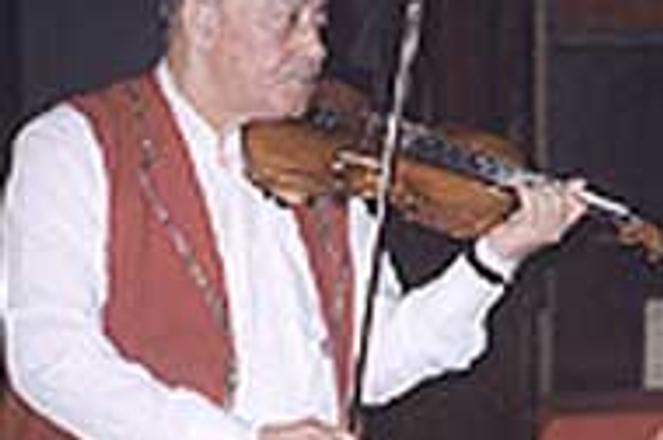Jozef Salai (violin) and Hedervári Aladár (accordion) say that since the fall of communism in 1989, the demand for Gypsy bands has dwindled.Andrea Chalupová
On a cold Friday night in February, Kláštorná vináreň wine cellar in the Bratislava Old Town was full of dancing and singing as patrons warmed to the festive playing of the performing Gypsy band. The violinist approached each table and asked for requests - csardas (a Hungarian dance with a slow introduction and wild finish), Russian and Slovak folk-tunes, or anything else they could play.
Unfortunately, such scenes are becoming increasingly rare. Gypsy musicians have long been an integral part of central European culture, just as entertaining people through music has long been the Romany way of life. But while the scene at Kláštorná vináreň might suggest otherwise, the rich tradition of Gypsy music has been muted since the fall of communism, as tough economic times mean musicians are no longer assured of restaurant bookings.
"You should have been here during communism," said a Kláštorná waiter on a quiet night March 17. "By now, everybody would have been singing. Then we could talk about atmosphere."
But the atmosphere he speaks of is now hard to find. "It's the economic situation," he lamented with a wave of his hands, as if to show the hopelessness of the current situation. "People have no time for the soul anymore."
Indeed, despite the joyous and furious playing of the Gypsy band, the audience and the atmosphere remain obstinately subdued. On this March evening, the band - consisting of just a violinist and an accordion player - appear lost in the absence of a cheering, enthusiastic crowd.
"Of course the atmosphere depends on the crowd," said accordion player Hedervari Aladár. "We used to be a band of five musicians. Every citizen could afford to come because it wasn't so expensive."
Aladár explained that his profession had been secure during communism thanks to Slovkoncert, a company which booked gigs for artists. "There was music all over Slovakia," he said. "But now, no one can afford to hire more than two or three musicians, if any."
Anina Botošová, the daughter of famous Slovak Roma violinist Ján Berky-Mrenica and who now serves as a governmental advisor on Slovak minority issues, said that the decline in live Gypsy music was largely responsible for an overall decline in live music since the revolution.
"In the 70's and 80's at least 10 to 15 restaurants in Bratislava had a great variety of live music," Botošová said March 22. "Today, restaurant owners play a CD or a radio station. All the colour and originality that used to characterise this region is therefore lost. It's a pity since this is really something we could promote to tourists."
The absence of a sufficient number of tourists in Slovakia is said to be another reason for the decline of live music. Pavol Kašuba, the manager of Hotel Tatra in Trenčín, said his hotel's restaurant used to hire live Gypsy bands on a nightly basis. But with the lack of tourism and the general decline of the Slovak economy, they had had to cut back.
"With the current financial circumstances, we can only afford three evenings of live music per week," Kašuba said. "Slovaks can't afford to visit restaurants on a regular basis, so we need more tourists. The Tourism Ministry should really start to do something because it's not working in this country and there are less and less foreigners coming."
As less foreigners and Slovaks pay to see the originality of the Gypsy band, the art plays out its slow death. Adding to their inaccessibility to potential viewers is the fact that most vinárne (wine cellars) hosting bands rarely advertise. Fortunately, Gypsy music has not died out completely - for those who want to wine and dine to the tones of romantic violins there are still places to go. The music lives on, even though it's not always easy to find, and no longer comes served on a silver platter.
Although the art of Gypsy music is suffering through an alarming decline, there are still several venues across the country which offer live bands, particularly Gypsy bands. Here are a few:
Bratislava
Káštorná Vináreň,
Františkánska 1. Tel: 5443 0430. Live music every day except Sun. starting at 19:00.
Veľkí Františkáni,
Františkánske námestie 10. Tel: 5443 3073. Live music every day except Sun. starting at 20:00.
Trenčín
Hotel Tatra,
Ulica Štefánika 2. Tel: 0831 650 6111. Live music with whole band Thu. - Sat. starting at 19:30.
Banská Bystrica
Restaurant Červený Rak,
Námestie SNP 13. Tel: 088 415 3882. Live music on Thu. between 17:00 to 21:00.
Restaurant Zlatý Bažant,
Námestie SNP 11. Tel: 088 412 4500. Live music with full band Tue. - Fri. starting at 18:00.
Košice
Hotel Centrum,
Južná trieda 2A. Tel: 095 762 257. Live music with full band Tue. - Fri. starting at 20:00.


